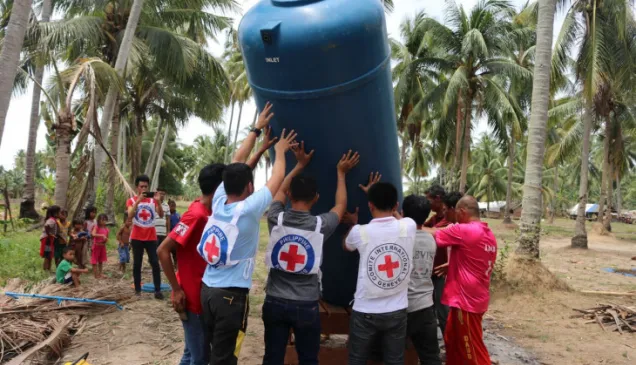I have just returned from the Sahel region, a place hit hard by the waves of armed conflict, environmental degradation, and climate shock.
There, I witnessed a deep humanitarian crisis.
All aspects of lives are impacted: health, water, economic insecurity.
Over many years, the ICRC has witnessed these trends all over the world, in many conflict regions.
Wars are causing environmental damage and destruction. Suffering is increasing as the climate crisis intensifies.
Wars fought without respect of international humanitarian law cause even greater destruction.
Today, 12 of the 20 countries most vulnerable to climate change are also reeling from conflict.
It is simply not acceptable, not practical, not ethical to solely assist people in the aftermath.
Humanitarians are not the clean-up crew of the international community.
Collectively, we must do more to prevent people's suffering.
The ICRC is helping to build strong communities that can withstand environmental degradation and successive climate shocks.
We are supporting micro-economic enterprises, building flood walls, vaccinating livestock and distributing drought-resistant seeds.
We are reinvigorating our call for enhanced respect of international humanitarian law.
International humanitarian law remains an important tool for warring parties to reduce their impact on the natural environment.
For too long the environment has been a neglected victim of conflict.
Poisoned water sources, land contaminated by mines, deforestation.
The consequences on communities are severe and further weaken people's ability to cope with climate shocks.
For example, climate change threatens many of the lifelines that people rely on in conflict zones, such as clean drinking water and arable land. By prohibiting attacks on objects which are indispensable to the survival of the civilian population, international humanitarian law helps to prevent further suffering.
Climate change can also accelerate biodiversity loss, resulting in devastating consequences for people and for local economies.
IHL can provide a framework for designating areas of particular biological diversity as demilitarized zones during armed conflict, and can protect these fragile hotspots from additional degradation.
While the environment is frequently a casualty of war, it is rarely the priority of warring parties, despite their obligations under international humanitarian law.
Today, I am announcing the release of the ICRC's updated Guidelines on the Protection of the Natural Environment in Armed Conflict.
In 1994, the ICRC was encouraged to produce the first iteration of the Guidelines by the UN General Assembly.
The upgraded Guidelines reflect developments in treaty and customary international humanitarian law over the decades.
They bring together existing IHL rules that provide specific protection to the natural environment, along with general IHL rules, including those governing the conduct of hostilities and rules on specific weapons that protect the natural environment in conflict.
The Guidelines also recommend measures that parties may adopt to reduce environmental impacts of conflicts. For example, pre-assessing the potential damage of military operations and implementing proactive measures to reduce this impact.
We trust the Guidelines are a useful reference tool to assist warring parties to adopt concrete measures to enhance respect for IHL that protects the environment, including by promoting these rules and incorporating them in military manuals, national policies and legal frameworks.
This implementation is essential to ensure that the law is put into practice and dictates behavior in war.
For our part the ICRC will continue to partner with you – with all of you. We offer you our legal and policy expertise, advice on IHL rules and support on the integration of these in national frameworks.
We will also continue to work with armed forces to support practical implementation.
Dear colleagues, through the twin tragedies of conflict and climate shocks, terrible harm has been caused to people's lives and futures.
We must change this trajectory.
States can act to build the resilience of people living in conflict.
States can act to meet their obligations to respect international humanitarian law and protect the natural environment.
Millions of people living under the threat of conflict and climate shocks are depending on you.

